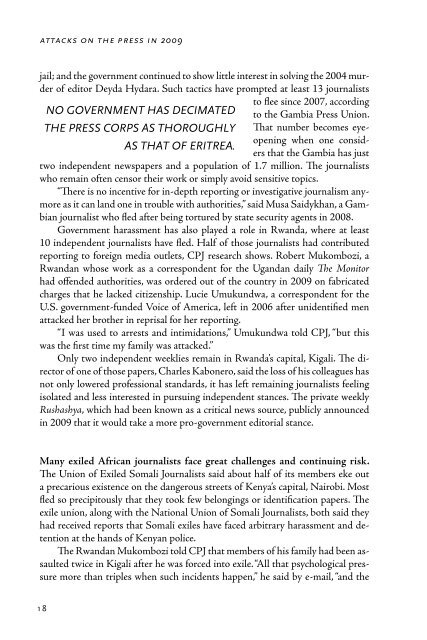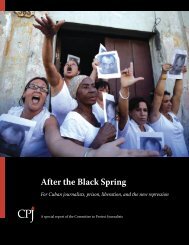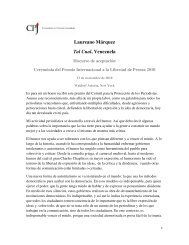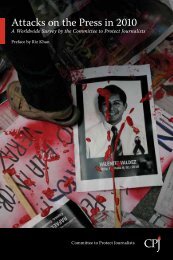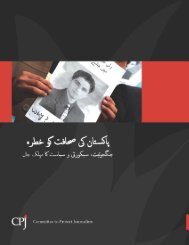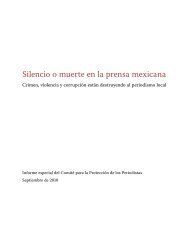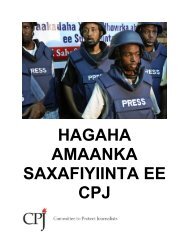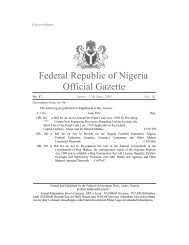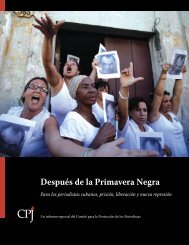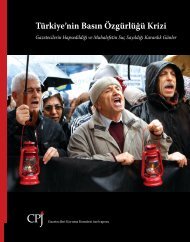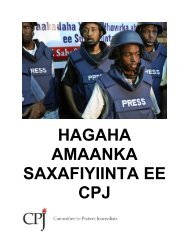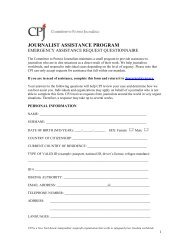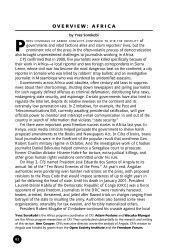Attacks on the Press - Committee to Protect Journalists
Attacks on the Press - Committee to Protect Journalists
Attacks on the Press - Committee to Protect Journalists
- No tags were found...
You also want an ePaper? Increase the reach of your titles
YUMPU automatically turns print PDFs into web optimized ePapers that Google loves.
attacks <strong>on</strong> <strong>the</strong> press in 2009africa: analysisjail; and <strong>the</strong> government c<strong>on</strong>tinued <strong>to</strong> show little interest in solving <strong>the</strong> 2004 murderof edi<strong>to</strong>r Deyda Hydara. Such tactics have prompted at least 13 journalistsNO government has decimated<strong>the</strong> press corps as thoroughlyas that of Eritrea.<strong>to</strong> flee since 2007, according<strong>to</strong> <strong>the</strong> Gambia <strong>Press</strong> Uni<strong>on</strong>.That number becomes eyeopeningwhen <strong>on</strong>e c<strong>on</strong>sidersthat <strong>the</strong> Gambia has justtwo independent newspapers and a populati<strong>on</strong> of 1.7 milli<strong>on</strong>. The journalistswho remain often censor <strong>the</strong>ir work or simply avoid sensitive <strong>to</strong>pics.“There is no incentive for in-depth reporting or investigative journalism anymoreas it can land <strong>on</strong>e in trouble with authorities,” said Musa Saidykhan, a Gambianjournalist who fled after being <strong>to</strong>rtured by state security agents in 2008.Government harassment has also played a role in Rwanda, where at least10 independent journalists have fled. Half of those journalists had c<strong>on</strong>tributedreporting <strong>to</strong> foreign media outlets, CPJ research shows. Robert Mukombozi, aRwandan whose work as a corresp<strong>on</strong>dent for <strong>the</strong> Ugandan daily The M<strong>on</strong>i<strong>to</strong>rhad offended authorities, was ordered out of <strong>the</strong> country in 2009 <strong>on</strong> fabricatedcharges that he lacked citizenship. Lucie Umukundwa, a corresp<strong>on</strong>dent for <strong>the</strong>U.S. government-funded Voice of America, left in 2006 after unidentified menattacked her bro<strong>the</strong>r in reprisal for her reporting.“I was used <strong>to</strong> arrests and intimidati<strong>on</strong>s,” Umukundwa <strong>to</strong>ld CPJ, “but thiswas <strong>the</strong> first time my family was attacked.”Only two independent weeklies remain in Rwanda’s capital, Kigali. The direc<strong>to</strong>rof <strong>on</strong>e of those papers, Charles Kab<strong>on</strong>ero, said <strong>the</strong> loss of his colleagues hasnot <strong>on</strong>ly lowered professi<strong>on</strong>al standards, it has left remaining journalists feelingisolated and less interested in pursuing independent stances. The private weeklyRushashya, which had been known as a critical news source, publicly announcedin 2009 that it would take a more pro-government edi<strong>to</strong>rial stance.Many exiled African journalists face great challenges and c<strong>on</strong>tinuing risk.The Uni<strong>on</strong> of Exiled Somali <strong>Journalists</strong> said about half of its members eke outa precarious existence <strong>on</strong> <strong>the</strong> dangerous streets of Kenya’s capital, Nairobi. Mostfled so precipi<strong>to</strong>usly that <strong>the</strong>y <strong>to</strong>ok few bel<strong>on</strong>gings or identificati<strong>on</strong> papers. Theexile uni<strong>on</strong>, al<strong>on</strong>g with <strong>the</strong> Nati<strong>on</strong>al Uni<strong>on</strong> of Somali <strong>Journalists</strong>, both said <strong>the</strong>yhad received reports that Somali exiles have faced arbitrary harassment and detenti<strong>on</strong>at <strong>the</strong> hands of Kenyan police.The Rwandan Mukombozi <strong>to</strong>ld CPJ that members of his family had been assaultedtwice in Kigali after he was forced in<strong>to</strong> exile. “All that psychological pressuremore than triples when such incidents happen,” he said by e-mail, “and <strong>the</strong>restricted communicati<strong>on</strong> between <strong>the</strong> exiled journalist and his/her family makes<strong>the</strong> harm <strong>on</strong> both sides enormous.”Gambian journalists seeking refuge typically move <strong>to</strong> Dakar, Senegal, but<strong>the</strong>y are rarely at ease because of <strong>the</strong> suspected presence of Gambian securityagents, said Demba Jawo, former head of <strong>the</strong> Gambian <strong>Press</strong> Uni<strong>on</strong>. “Sometimesexiled Gambian journalists feel compelled <strong>to</strong> move periodically <strong>to</strong> avoid detecti<strong>on</strong>from <strong>the</strong>se security agents,” he said.Even those in safe circumstances face enormous professi<strong>on</strong>al challenges. Atleast 48 Zimbabwean journalists have been forced in<strong>to</strong> exile since 2000, most of<strong>the</strong>m in <strong>the</strong> early half of <strong>the</strong> decade during sustained harassment by PresidentRobert Mugabe’s government, according <strong>to</strong> CPJ research. In interviews with CPJ,many of <strong>the</strong>se Zimbabwean journalists have said that it <strong>to</strong>ok years for <strong>the</strong>m <strong>to</strong>re-establish <strong>the</strong>mselves professi<strong>on</strong>ally and secure sound ec<strong>on</strong>omic footings for<strong>the</strong>ir families. Many had <strong>to</strong> aband<strong>on</strong> journalism as a career.Yet some who revived <strong>the</strong>ir careers also created a vibrant diaspora newsmedia. Gerry Jacks<strong>on</strong>, an exiled Zimbabwean journalist, launched <strong>the</strong> L<strong>on</strong>d<strong>on</strong>basedSW Radio in 2001. The stati<strong>on</strong> broadcasts programming in<strong>to</strong> Zimbabwein English and in <strong>the</strong> Sh<strong>on</strong>a and Ndebelelanguages. Wilf Mbanga, ano<strong>the</strong>r exile,started The Zimbabwean newspaper in2005. Based in his new home in England,Mbanga produces a weekly that circulatesin <strong>the</strong> United Kingdom, South Africa—and Zimbabwe. Abel Mutasakani, wholeft for South Africa in 2004, joined with o<strong>the</strong>r colleagues <strong>to</strong> start <strong>the</strong> Web publicati<strong>on</strong>ZimOnline.Ethiopian and Eritrean exiles have similarly launched Web sites, typicallyfocusing <strong>on</strong> events back home. While limited in what <strong>the</strong>y can report firsthand,<strong>the</strong>se sites receive and report leaked documents, interview disaffected governmentsources, and offer critical political commentary.The ir<strong>on</strong>y that exiled journalists are getting independent news and views in<strong>to</strong><strong>the</strong>ir native countries is not lost <strong>on</strong> people such as <strong>the</strong> Zimbabwean Geoff Hill.“Since nati<strong>on</strong>alizing <strong>the</strong> press in 1981, Mugabe has d<strong>on</strong>e his best <strong>to</strong> c<strong>on</strong>trol <strong>the</strong>flow of informati<strong>on</strong>, but now <strong>the</strong>re are so many leaks in <strong>the</strong> bucket, it is more likea watering can,” said Hill, himself an exiled journalist who still reports <strong>on</strong> <strong>the</strong>country. “Much of <strong>the</strong> credit for this must go <strong>to</strong> <strong>the</strong> hard breed of Zimbabweanjournalists—both at home and in exile—who refuse <strong>to</strong> surrender.”Tom Rhodes is CPJ’s Africa program coordina<strong>to</strong>r.Exiled Zimbabweanshave created vibrantdiaspora media.1 8 1 9


